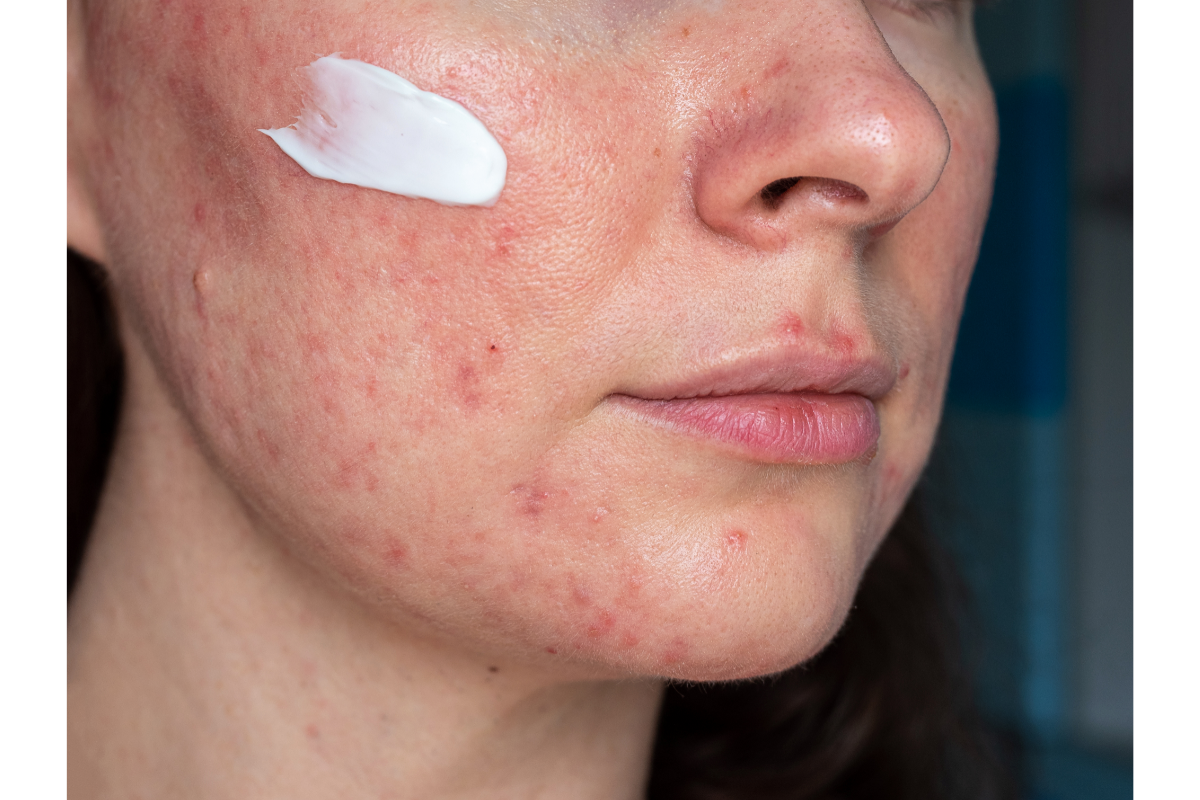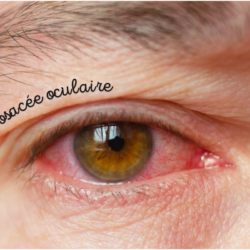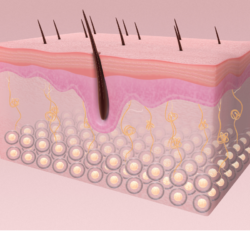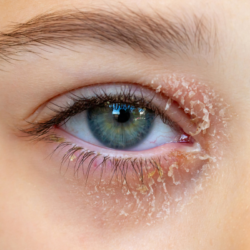April is Rosacea Awareness Month, an often overlooked and underdiagnosed skin disease that affects millions of people around the world. During this month, we have the opportunity to highlight this chronic condition that can significantly impact the quality of life of those affected. In this article, we will discuss advances in rosacea management, current treatments and tips for living better with this disease. We will also explore the importance of awareness and education for better management of rosacea. So, let’s dive into this universe together and discover the latest advances to help people suffering from rosacea find a more serene and fulfilled life.
What is rosacea?
Rosacea is a chronic skin disease that mainly affects the face. It is characterized by redness, small dilated blood vessels and, sometimes, pimples or bumps.
What are the different types of rosacea?
There are four types of rosacea:
- Erythematotelangetase rosacea: redness and dilated blood vessels.
- Papulopustular rosacea: redness and pimples.
- Phymatous rosacea: thickening of the skin and bumps.
- Ocular rosacea: damage to the eyes.
What causes rosacea?
The exact causes of rosacea are not yet fully understood, but it is likely that a combination of genetic, environmental and immunological factors is involved. Research continues to better understand the mechanisms that trigger this disease.
What are the triggers?
Certain factors are known to trigger or worsen rosacea symptoms. Among them, we find sun exposure, stress, temperature changes, alcohol, spices or some cosmetics.
What are the symptoms of rosacea?
The symptoms of rosacea vary depending on the type of rosacea and the severity of the disease. The most common are constant burning sensations, itching, redness, dilated blood vessels, pimples, bumps, dry and irritated eyes, and inflamed eyelids.
How to diagnose rosacea?
The diagnosis of rosacea is mainly based on the clinical examination of the patient and the identification of characteristic symptoms. Sometimes additional tests may be needed to rule out other similar skin conditions.
What are the current treatments?
There is no cure for rosacea yet, but there are several treatment options to control symptoms and improve patients’ quality of life.
Drug treatments
Drug treatments play a vital role in the management of rosacea. They help control symptoms, reduce inflammation and improve the appearance of the skin. Here are some of the drug options available to treat rosacea:
- Antibiotic-based creams and gels : These topical treatments work by reducing inflammation and fighting pimple bacteria. Among the most commonly prescribed are metronidazole, erythromycin and clindamycin.
- Topical retinoids: Retinoids, derived from vitamin A, help reduce pimples and redness associated with rosacea. The most commonly used retinoids are adapalene, tazarotene and tretinoin.
- Anti-inflammatories: Anti-inflammatory creams and gels, such as ivermectin and azelaic, help reduce inflammation and redness. They are often prescribed in combination with other drug treatments for better effectiveness.
- Oral antibiotics: In some cases, oral antibiotics, such as doxycycline, minocycline or tetracycline, may be prescribed to treat more severe forms of rosacea. These antibiotics are used in the short term to reduce inflammation and flare-ups.
- Epsolay: Epsolay is an innovative treatment based on benzoyl peroxide in the form of cream, which should one day arrive on the French market. It has been shown to be effective in reducing redness and pimples associated with papulopustular rosacea. This drug offers a new treatment option for people with rosacea, with a different mode of action than current treatments.
It is important to note that each patient is unique and the response to drug treatments may vary. It is therefore essential to work closely with a dermatologist to find the most suitable treatment for each individual case.
Non-drug treatments
In addition to drug treatments, several non-drug options are available to help manage the symptoms of rosacea. These treatments offer interesting alternatives for people who are looking to minimize the use of drugs or who have not achieved satisfactory results with drug treatments.
- Photodynamics: Photodynamic therapy (PDT) uses specific light to activate a photosensitizer applied to the skin. This process causes the destruction of dilated blood vessels and inflammatory cells, helping to reduce redness and pimples. PDT can be performed in several sessions, and results vary depending on the severity of rosacea and skin type.
- Thermocoagulation: Thermocoagulation is a method that uses a controlled heat source to clot dilated blood vessels and treat redness associated with rosacea. In general, it is a dermatologist who performs thistechnique and several sessions may be necessary to obtain optimal results.
- Skincare for people with rosacea: A proper skin care routine is crucial to managing rosacea symptoms. Sufferers should prefer mild, hypoallergenic and non-comedogenic products. It’s also important to avoid triggers, such as alcohol-containing products, perfumes, and abrasive scrubs. Proper sun protection is also essential, as UV rays can worsen the symptoms of rosacea.
- Alternative medicine: Some people with rosacea turn to alternative approaches, such as acupuncture, aromatherapy or herbal medicine. Although studies on the effectiveness of these treatments are limited, some people may find relief by exploring these options.
- Lifestyle: Adopting a healthy lifestyle can also help manage rosacea. This includes eating a balanced diet, regular physical activity, managing stress, and avoiding known triggers, such as excessive sun exposure, alcohol consumption, or sudden changes in temperature.
@soin.et.nature ✨️ Une routine peau simple et efficace pour les peaux rosacées/atopiques ✨️ Allez jeter un œil sur mon article de blog spécial Rosacée & dites moi quels sont vos produits favoris en cas de poussée ✨️ Une routine compléments alimentaires pour aider sa peau, ça vous dirait ? #viral #astuce #pourtoi #peau #cicatrice #astucebeaute #peausensible #petitbudget #perpignan #conseilsbeaute #rosaceacheck #frenchpharmacie #rosacea #rosacee #rougeurs #taches #peauatopique #peausensible #skincare #isispharma #azelaicacid #acideazlaique #otc #cheap #couperose #il #yag #ipl l’Azerbaïdjan #laser #lasertreatment
What are the advances in the management of rosacea?
Thanks to advances in research, new therapeutic options are being studied to better manage rosacea, such as treatments targeting the immune system or vascularization of the skin. In addition, emphasis is placed on patient education and public awareness to promote early and appropriate care.
The importance of awareness and education
Rosacea awareness and public education are essential elements in improving the management of this disease and supporting those who suffer from it. Understanding the importance of awareness and education means recognizing that they improve diagnosis, facilitate access to treatment, prevent complications, reduce misconceptions and stigma, and foster research and innovation.
Indeed, by providing more information to healthcare professionals and patients about the signs and symptoms of rosacea, we promote a faster and more accurate diagnosis. This allows people with rosacea to better understand the different treatment options available and choose the treatment that best suits their situation.
Awareness and education also help to put in place preventive measures to avoid potential complications related to rosacea. Encouraging patients to consult a dermatologist as soon as the first symptoms appear is essential to ensure prompt and appropriate care. In addition, by educating the general public about rosacea and demystifying certain misconceptions, we help reduce stigma and improve social acceptance of people with this disease. This contributes to a better quality of life for patients.
Finally, the more rosacea is known and recognized as an important health problem, the more researchers and health institutions are encouraged to invest in research and development of new therapeutic solutions. This will expand treatment options and further improve the management of rosacea. In short, awareness and education around rosacea are essential to improve the quality of life of those affected. This Rosacea Awareness Month, let’s mobilize to share our knowledge and support those affected by this disease.
Tips for managing rosacea flare-ups
To manage rosacea flare-ups, it is important to know and avoid the triggers, to follow the prescribed treatments carefully and to adopt a suitable skin care routine.
Future challenges and opportunities
The challenges and opportunities for the future in the management of rosacea are many and varied. First of all, it is essential to better understand the mechanisms of this complex disease. Future research should focus on elucidating the causes and triggers of rosacea, which will lead to more targeted and personalized treatments.
Then, the creation of new treatments is necessary to offer more effective therapeutic solutions better adapted to the different subtypes of rosacea. Ongoing advances in the search for innovative molecules and techniques, such as Epsolay, offer hope for improving the management of the disease.
Another important issue is the fight against the stigma surrounding rosacea. This disease can have a significant impact on the quality of life of those affected. That’s why raising awareness and challenging misconceptions is crucial to help patients feel better understood and accepted. In addition, patient support should not be limited to drug or non-drug treatments. It is also essential to offer psychological and emotional support adapted to those affected, in order to help them live better with their disease on a daily basis.
Finally, the promotion of prevention and education is a major challenge to improve the management of rosacea. It is important to support and encourage information campaigns and awareness-raising initiatives, in order to promote early diagnosis and better care for those affected.
In sum, the challenges are many, but the opportunities for the future are encouraging for people suffering from rosacea. Scientific advances, new therapeutic approaches and public awareness will ultimately improve the management of the disease and offer a better quality of life to those affected.
Resources to learn more
To learn more about rosacea, several organizations and associations offer resources, such as the French Society of Dermatology or the National Rosacea Society.
FAQ
- What are the main symptoms of rosacea?
Redness, dilated blood vessels, pimples, bumps, dry, irritated eyes, and inflamed eyelids.
- What causes rosacea?
They are not yet fully elucidated. But it is likely that a combination of genetic, environmental and immunological factors is involved.
- Is there a cure for rosacea?
There is no cure for rosacea yet, but there are several treatment options to control symptoms and improve patients’ quality of life.
- How to take care of your skin in case of rosacea?
Adopt a suitable skin care routine, use gentle and hypoallergenic products. As well as avoiding triggers and protecting the skin from the sun’s rays is crucial.
- Why is it important to raise awareness about rosacea?
To improve diagnosis, care and support for those affected. This requires better information for patients, health professionals and the general public about symptoms, treatments and triggers.
Sources :
- Gold LS, Papp K, Lynde C, et al. Treatment of rosacea with concomitant use of topical ivermectin 1% cream and brimonidine 0.33% gel: a randomized, vehicle-controlled study. J Drugs Dermatol 2017;16(9):909–916.
- Kuo S, Huang KE, Davis SA, Feldman SR. The rosacea patient journey: a novel approach to conceptualizing patient experiences. Cutis 2015;95 :37–43.
- Gallo RL, Baldwin HE, Stein Gold L, Harper JC. Update on facial erythema in rosacea. J Drugs Dermatol 2021 Aug 1;20(8):861–864. Published online July 19, 2021. DOI:10.36849/JDD.6062.
- National Rosacea Society. Patients Need Patience: Give Rosacea Therapy Time. Published Dec. 13, 2022.
- Lukaviciute L, Ganceviciene R, Navickas P, et al. Anxiety, depression, and suicidal ideation amongst patients with facial dermatoses (acne, rosacea, perioral dermatitis, and folliculitis) in Lithuania. Dermatology 2020;236 (4):314–322.







